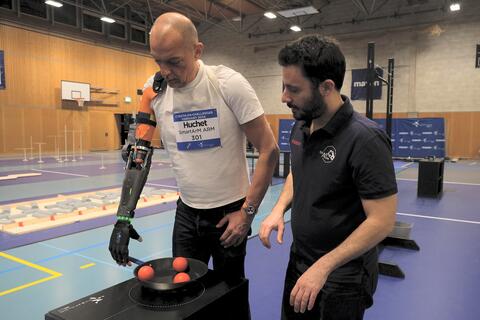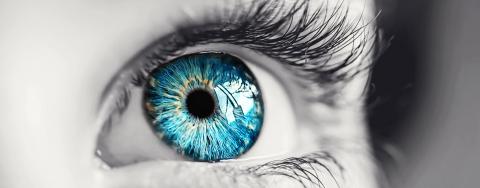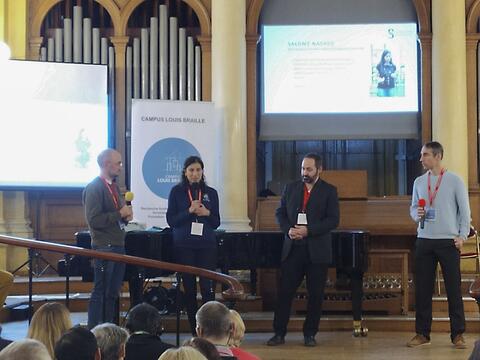
The Louis Braille Campus has Opened
European Center for Innovation and Research in Visual Impairment.
On december 3 2024, the Louis Braille campus was inaugurated at the Institut national des Jeunes aveugles (Inja; National Institute for Blind Youth) in Paris. Dedicated to research, education, and innovation in the field of visual impairment, this new European center of excellence aims to promote the autonomy of visually impaired and blind individuals.
Research as a Foundational Pillar
The event brought together figures from politics, research, and innovation, as well as members of civil society, united by a common ambition: to take concrete action to address the needs of individuals with visual impairments.
Following a series of determined speeches, including those by the campus president Xavier Musca, government ministers responsible for individuals with disabilities and education, journalist Laëtitia Bernard, speaker Laurène Messeca, and representatives from the City of Paris, the morning was devoted to research.
Ludovic Petitdemange, deputy director of LERMA at Sorbonne University and visually impaired himself, led discussions, highlighting promising research initiatives.
One such initiative, Open A-Eye, a guidance system for blind and visually impaired individuals, was presented by its creators Ludovic Saint-Bauzel and Fabien Vérité, researchers at the Institute of Intelligent Systems and Robotics (ISIR), along with Salomé Nashed, a bioinformatician at Sorbonne University who leads the team. This project recently won the silver medal at Cybathlon 2024, an international competition showcasing technological innovations for individuals with disabilities.
The presentation of various research projects dedicated to visual impairment was followed by Serge Picaud, director of the Vision Institute (Sorbonne University, Inserm, CNRS), who highlighted the potential synergies between his institute and the Louis Braille Campus. According to Picaud, this collaboration could accelerate the development of tailored technological solutions and pave the way for innovative learning pathways.
These exchanges showcased the campus’s potential to become a hub for fruitful partnerships in research, innovation, and education.
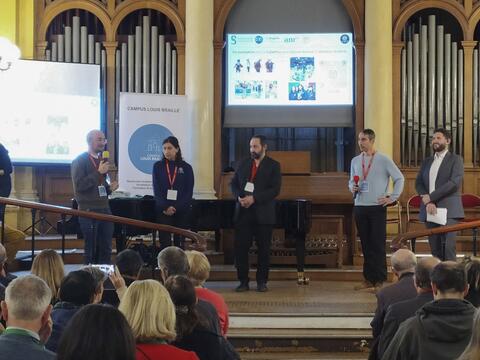
L'équipe A-eye présente son projet de dispositif de guidage pour les personnes déficientes visuelles. ©Sorbonne Université
The presentation of various research projects dedicated to visual impairment was followed by Serge Picaud, director of the Vision Institute (Sorbonne University, Inserm, CNRS), who highlighted the potential synergies between his institute and the Louis Braille Campus. According to Picaud, this collaboration could accelerate the development of tailored technological solutions and pave the way for innovative learning pathways.
These exchanges showcased the campus’s potential to become a hub for fruitful partnerships in research, innovation, and education.
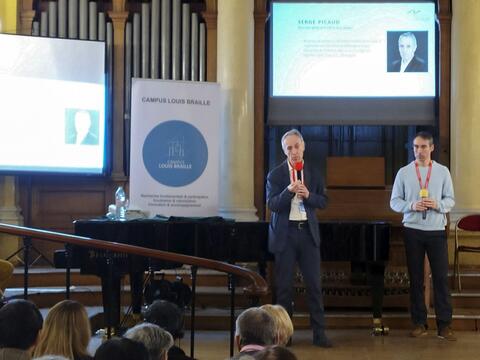
Serge Picaud, directeur de l’Institut de la Vision, et Ludovic Petitdemange, directeur adjoint du Lerma ©Sorbonne Université
A Partnership with Sorbonne University
At midday, Stéphanie Bonneau, Vice President for Education at Sorbonne University, announced the preparation of a forthcoming partnership agreement between Sorbonne University and the Louis Braille Campus. “This partnership embodies our commitment to innovative research, accessible education, and a truly inclusive society,” she stated. Bonneau outlined the primary goals of this collaboration: fostering a shared research dynamic, developing pedagogical innovations for students, and pursuing the shared ambition of a more inclusive society.
She also highlighted Sorbonne University’s broader commitment to inclusivity, referencing initiatives such as faculty positions reserved for individuals with disabilities and efforts to support elite parasport athletes. “This partnership with the Louis Braille Campus will strengthen and enrich our shared commitment,” she concluded.
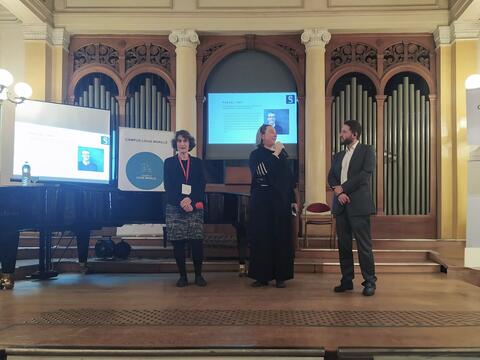
Stéphanie Bonneau, vice-présidente Formation de Sorbonne Université exposant le projet de partenariat avec le campus Louis Braille ©Sorbonne Université
Innovations Transforming Daily Life for Visually Impaired Individuals
The demonstration area showcased promising research projects, such as Ability, a multisensory tablet with vibrotactile feedback, and solutions like Keynoa, an innovative haptic device enabling individuals to "see" with their fingers. Another project, Inovisup, focuses on enhancing the accessibility of visual content, including illustrations and diagrams, for blind individuals.
In the realm of innovation, the startup Okeenea presented advancements in inclusive urban mobility, while Deritech unveiled an innovation making tactile documents interactive and easy to explore through intelligent voice chat. Other companies, such as Artha, demonstrated a camera connected to a haptic belt, and SonarVision introduced a guidance solution utilizing computer vision.
The demonstration space also featured citizen initiatives, such as EyeLevel, an association promoting digital inclusion for blind and visually impaired individuals.
Training-related discussions were also held, involving Ludovic Petitdemange, representatives from the Valentin Haüy Association, apiDV's support division, and the Contentsquare Foundation, which advocates for digital inclusion.
The day concluded with the screening of a documentary on the French blind football team, followed by discussions with Paralympic medalists from the Paris 2024 Games.
The opening of the Louis Braille Campus marks the beginning of a journey where innovation and humanity converge to build a more accessible world. This unique center is already positioning itself as a key player in addressing the challenges of accessibility and autonomy for visually impaired individuals.

